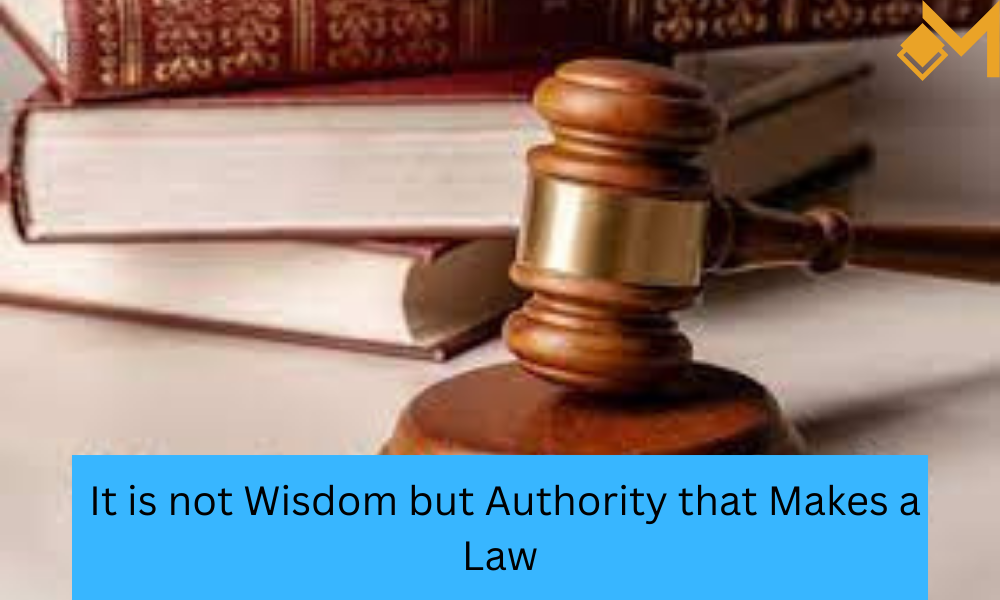The intricate interplay of power and wisdom in lawmaking is a central theme in the intricate discipline of legal philosophy. The quote “It is not wisdom but authority that makes a law” encapsulates a key debate in legal theory’s foundation. Exploring this discourse, we uncover how power and wisdom shape the intricate fabric of our legal systems and frameworks.
Recognizing the Claim
The statement seems to suggest, at first look, that laws originate from the decree of a ruling power rather than from logical consideration or moral understanding. Put another way, a law’s validity stems from the authority bestowed upon the legislator rather than from its innate wisdom or moral basis. This viewpoint poses important queries concerning the nature of legislation, the function of legislators, and the connection between justice and authority.
The Power of Lawmakers
The idea of legislative authority is fundamental to the claim. Within conventional legal systems, lawmakers possess the ability to create, modify, and revoke laws, so exercising significant control over the legal structure of the community. This authority, which gives legislation credibility and enforceability, is frequently drawn from democratic mandates, historical precedent, or constitutional requirements. But, the wisdom or fairness of the laws passed is not ensured by the very presence of authority.
The Wisdom Role in Law
On the other hand, a lot of people contend that wisdom should be taken into consideration while making laws. In addition to academic prowess, wisdom also includes moral judgment and caution when making decisions. According to this viewpoint, wisely written laws are more likely to represent the needs, goals, and values of society, advancing equality, justice, and the common good. Furthermore, wisdom encourages discussion and participation from a range of viewpoints, guaranteeing that laws are based on rational discussion rather than arbitrary decrees.
The Point Where Authority and Wisdom Collide
In lawmaking, wisdom and power are often depicted as conflicting, yet they can synergize effectively, leading to beneficial legislation. Legislators should, ideally, use their authority wisely and in line with the values of justice and wisdom. This viewpoint posits that legitimate authority doesn’t stem solely from coercive force but from adherence to moral and ethical standards.
Historical and Modern Views
The conflict between knowledge and power has affected political and legal structures throughout history. The distribution of power between rulers and the ruled has been a source of debate and change throughout history, spanning from the concept of monarchs’ divine right to contemporary constitutional democracies. The wisdom-authority dichotomy is relevant today as discussions over the validity of laws frequently center on representation, accountability, and social fairness.
Legal Theory and Practice Implications
The statement “Authority, not wisdom, is what makes a law” provokes critical thought on the basis of legal systems and the use of legislative power. It forces us to consider the sources of power, the standards for decency in legislation, and the procedures that guarantee legitimacy and responsibility. It also emphasizes how critical it is to have a strong legal culture that supports the values of justice and the rule of law, as well as civic involvement and moral leadership.
Conclusion
the claim that “authority, not wisdom, is what makes a law” encourages deep reflection in the field of legal philosophy. Authority shapes legal norms, yet legitimacy hinges on alignment with values like knowledge, justice, and the common good.Let us seek to create a legal system that is not only authoritative but also sensible, just, and representative of our greatest goals as a community as we negotiate the complexity of law and government.
FAQS
1. What does it imply to say that authority, not intelligence, is what creates a law?
This statement suggests that the legislator’s authority, not wisdom or morality, determines the legality and enactment of a law.
2. Who is credited with saying that authority, not intellect, is what creates laws?
Thomas Hobbes, renowned for his political theory, notably Leviathan, is often credited with originating the phrase, highlighting authority’s primacy.
3. Does this mean that when it comes to drafting laws, intelligence is unimportant?
Highlighting authority’s weight doesn’t diminish wisdom’s relevance, suggesting a nuanced equilibrium in the legislative realm’s dynamics and decision-making. Instead, it draws attention to the conflict that exists between knowledge and power when it comes to making laws.
4. What role does authority play in the creation of laws?
Authority, granted to legislative bodies or governing entities, empowers the creation, modification, and enforcement of laws governing societal conduct. Legitimacy and enforcement of laws stem from the power bestowed upon legislators.
5. How does wisdom enter into the formulation of laws?
Wisdom, comprising prudence, rationality, and moral insight, serves as a compass in crafting equitable and rational legislative frameworks. While often implicit, intelligence is essential in formulating laws that uphold societal norms and promote the common good effectively.
Sign up for our Daily newsletter
We'll be in your inbox every morning Monday-Saturday with all the day’s top business news, inspiring stories, best advice and reporting from Entrepreneur,


